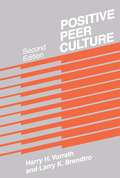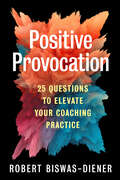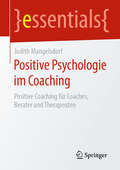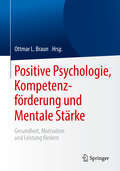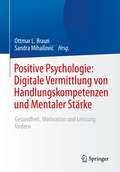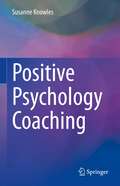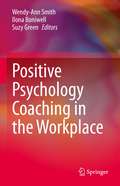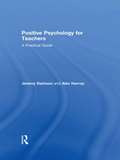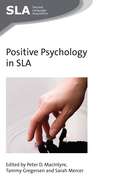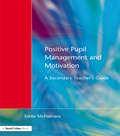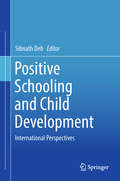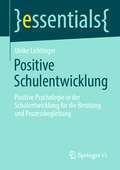- Table View
- List View
Positive Peace in Schools: Tackling Conflict and Creating a Culture of Peace in the Classroom
by Hilary Cremin Terence BevingtonPositive Peace in Schools offers a fresh and challenging perspective on the question of conflict, violence and peace in schools. Drawing on the most up-to-date theory and research from the field of peace and conflict studies, this book provides readers with a strong understanding of the concept of positive peace, and how the dimensions of peace-keeping, peace-making and peace-building can be robustly applied in schools. This accessible book challenges educators everywhere to reconsider the nature of direct and indirect violence in schools, and the structural and cultural factors that sustain it. It engages with global traditions of harmony and balance that are often neglected in Western notions of liberal securitised peace, in order to suggest a model for schools that integrates inner and outer peace. The book also includes practical sections that outline restorative approaches to discipline, peer mediation, circle learning, and classroom activities to promote mindfulness, inclusion and wellbeing. Taken together, these provide a philosophy and a highly effective framework for building conflict literacy and a culture of peace in schools.
Positive Pedagogy across the Primary Curriculum
by Jonathan BarnesThis book offers a positive approach to thematic cross-curricular teaching. Within a clear focus on humanitarian and inclusive values, it offers guidance on robust learning in the subject disciplines within a set of highly involving themes. Its fundamental aim is the mental, physical, social and intellectual wellbeing of children and their teachers. Discover how your teaching can support genuine age-appropriate engagement in contemporary and global issues like shared values, anti-racism, social inequalities and environmental concerns. Learn ways of drawing from a wider, inclusive and motivating curriculum without compromising progression in subject-specific learning. Case studies and clear guidance on planning and assessment offer strong practical advice to support you in setting the foundations for smart, informed and relevant primary school teaching. Jonathan Barnes is a Visiting Senior Research Fellow at Canterbury Christ Church University and a National Teaching Fellow.
Positive Pedagogy across the Primary Curriculum
by Jonathan BarnesThis book offers a positive approach to thematic cross-curricular teaching. Within a clear focus on humanitarian and inclusive values, it offers guidance on robust learning in the subject disciplines within a set of highly involving themes. Its fundamental aim is the mental, physical, social and intellectual wellbeing of children and their teachers. Discover how your teaching can support genuine age-appropriate engagement in contemporary and global issues like shared values, anti-racism, social inequalities and environmental concerns. Learn ways of drawing from a wider, inclusive and motivating curriculum without compromising progression in subject-specific learning. Case studies and clear guidance on planning and assessment offer strong practical advice to support you in setting the foundations for smart, informed and relevant primary school teaching. Jonathan Barnes is a Visiting Senior Research Fellow at Canterbury Christ Church University and a National Teaching Fellow.
Positive Peer Culture
by D.E.C. EversleyThis revision of an important and path-breaking work holds to its central argument that troubled young people can develop self-worth, significance, dignity, and responsibility only through commitment to the positive values of helping and caring for others.An enlarged and revised edition of the authors' pioneering work on building positive youth culture, Positive Peer Culture retains the practical orientation that made the original attractive to teachers and youth workers, while adding new material on positive peer culture (PPC) in schools and community settings, research on PPC, and guidelines for maintaining program effectiveness and quality. Concepts of positive peer culture have been applied in a wide variety of educational and treatment settings including public and alternative schools, group homes, and residential centers. Vorrath and Brendtro describe specific procedures for getting youth "hooked on helping" through peer counseling groups, and for generalizing caring behavior beyond the school or treatment environment through community-based service learning projects.The authors contend that the young people who populate our nation's schools are in desperate need of an antidote to the narcissism, malaise and antisocial life-styles that have become so prevalent, and that this book seeks to provide a way of meeting their increasing cry to be used in some demanding cause. On publication of the first edition, Richard P. Barth, Frank A. Daniels Professor for Human Services Information Policy, School of Social Work, University of North Carolina at Chapel Hill called Positive Peer Culture "a significant contribution to the field."
Positive Provocation: 25 Questions to Elevate Your Coaching Practice
by Robert Biswas-DienerHone your skills and strengthen your practice with this series of twenty-five fresh and provocative questions for reflection that challenge the conventional wisdom in the coaching profession. Like any established profession, coaching is full of unexamined assumptions. These need to be regularly questioned and tested to keep the profession vital and valuable. Coaches need to engage in the same kind of scrutiny and self-examination that offers such powerful benefits to their clients. In Positive Provocation, coaching thought leader Robert Biswas-Diener asks a series of twenty-five provocative and sometimes playful questions that take a fresh look at some of coaching's most cherished beliefs. What if coaches had agendas? Why are ethics so boring? What's so great about interrupting? Can we trust eureka moments? What if we used less empathy? This is not an attack on the coaching profession-Biswas-Diener writes with a light, conversational, and often humorous touch. These are positive provocations, meant to stimulate your curiosity, engage you with the latest research, and invite you to see your practice with new eyes. Biswas-Diener covers philosophies of coaching, communicating with clients, common coaching concepts, coaching interventions, and a big final provocation: should coaching be informed by science? This book will give you a richer understanding of the coaching process, make you more articulate about your own beliefs, and allow you to feel more engaged with the craft.
Positive Psychologie - Erfolgsgarant oder Schönmalerei?
by Michael TomoffPositive Psychologie - Erfolgsgarant oder Schönmalerei? Entdecken Sie die Doppelkante der Positiven Psychologie: Ein Schlüssel zu mehr persönlichem und beruflichem Erfolg oder doch nur eine rosarote Brille? Diplom-Psychologe Michael Tomoff entführt Sie in eine Welt, die sowohl die glänzenden als auch die schattigen Seiten dieser bewegenden Wissenschaft beleuchtet. Das vorliegende Buch ist weit mehr als ein Glücksratgeber. Es ist eine fundierte, kritische und dennoch humorvolle Untersuchung der Positiven Psychologie, die sich sowohl an Lehrer, Eltern, Führungskräfte, Mitarbeiter, Coaches und auch Trainer richtet – egal ob Laien oder Experten. Mit einem klaren Blick auf die wissenschaftliche Basis und die praktische Anwendung beleuchtet der Autor die Mythen und Missverständnisse rund um die Wissenschaft des Wohlbefindens: Macht Geld glücklich? Sind Eltern zufriedener als Kinderlose? Welche Rolle spielen Schuld und Scham bei der Kindererziehung? Wie kann die Positive Psychologie die Schule oder das Unternehmen von morgen unterstützen und formen? Und sollte sie das überhaupt? Durch die elegante, mundgerechte Zusammenfassung aktueller Forschungen, die Vorstellung leicht umsetzbarer Übungen, Tools und Interventionen sowie die Erörterung der Relevanz der Positiven Psychologie in verschiedenen Kulturen und Lebensbereichen bietet dieses Buch einen umfassenden Überblick und praktische Anleitungen. Erfahren Sie, wie die Positive Psychologie in Schulen, Unternehmen und im persönlichen Leben konkret Anwendung finden kann, und welche Vorteile sie bietet. Michael Tomoff ist nicht nur ein erfahrener Psychologe, sondern auch ein leidenschaftlicher Botschafter für das Potenzial der Positiven Psychologie, das Wohlstand und Wohlbefinden zu fördern und dabei realistisch und kritisch zu bleiben. Mit seiner Ausbildung an der University of California in Berkeley und seiner breiten Erfahrung als Trainer, Berater und systemischer Coach bringt ereine einzigartige Perspektive und eine Fülle von praktischen Einsichten in dieses fesselnde Werk ein. In seinem Blog „Was Wäre Wenn“ gibt er wichtige Impulse zu einer Vielzahl von Themen wie Dankbarkeit, Komplimenten, dem Nein-Sagen, Grenzensetzen oder auch stärkenfokussierter Führung.
Positive Psychologie im Coaching: Positive Coaching für Coaches, Berater und Therapeuten (essentials)
by Judith MangelsdorfDieses essential bietet eine Einführung in die wachstumsorientierte Prozessbegleitung durch Ansätze und Methoden der Positiven Psychologie. Es gibt einen Überblick über die Grundlagen des Positive Coachings in Ergänzung zu anderen lösungsorientierten Verfahren. Sie lernen sowohl die theoretischen Grundlagen des Positive Coachings als auch die konkreten Ansätze zur wachstumsorientierten Begleitung in den verschiedenen Phasen des Coachingprozesses kennen. Anhand wissenschaftlicher Konzepte der Positiven Psychologie und praktischer Methoden wird dargestellt, wie aktuelle Herausforderungen von Klienten genutzt werden können, um zu Potenzialentfaltung und persönlichem Wachstum beizutragen.
Positive Psychologie in Bildungseinrichtungen: Konzepte und Strategien für Fach- und Führungskräfte (essentials)
by Michaela BrohmMichaela Brohm stellt Konzepte und Strategien zur positiven Energetisierung von Individuen und Organisationen im Bildungsbereich vor. Sie zeigt, wie sich das energetische Niveau einer Bildungsorganisation durch positiv-psychologische Maßnahmen heben lässt, und gibt Impulse für einen motivierenden, Mensch und Organisation belebenden Führungsstil. Wertvolle Anregungen, inspirierende Beispiele und ein umfassendes Inventar zu den zentralen Elementen positiven Führungsverhaltens fordern zum Transfer in die Praxis heraus.
Positive Psychologie in der Erziehung: Für Eltern und andere Erziehende (essentials)
by Michael TomoffMichael Tomoff bietet einen #65533;berblick #65533;ber die M#65533;glichkeiten, die der neue Wissenschaftszweig der Positiven Psychologie Menschen bei der Erziehung bieten kann. In diesem essential gibt der Autor sowohl Impulse f#65533;r eine positivere Erziehung mithilfe von Erkenntnissen aus der Positiven Psychologie als auch eine Perspektive, was Eltern oder Erzieher f#65533;r sich tun k#65533;nnen, um den teilweise sehr gro#65533;en Belastungen Stand zu halten oder sie subjektiv zu vermindern.
Positive Psychologie, Kompetenzförderung und Mentale Stärke: Gesundheit, Motivation und Leistung fördern
by Ottmar L. BraunDieses Buch veranschaulicht Personalentwicklungsmaßnahmen zur Förderung von Selbstkompetenzen, Sozialkompetenzen, Methodenkompetenzen und mentaler Stärke im Rahmen der Positiven Psychologie. Im Mittelpunkt steht das Modell des Positiven Selbstmanagements mit folgenden drei großen Komponenten: Methoden und Techniken der Positiven Psychologie und Kompetenzen wie finanzielle Selbstmanagementkompetenz, Entscheidungskompetenz, Resilienztechniken, Vitalität, Kompetenzen in Smalltalk und Networking, Präsentationskompetenz, die Reduzierung dysfunktionaler Kognitionen, Problemlösekompetenz und Zielklarheit führen zur mentalen Stärke.Mentale Stärke: Diese setzt sich aus Selbstwirksamkeitserwartungen, Optimismus, Hoffnung, Resilienz, Selbstvertrauen und der Fähigkeit zur Emotionsregulation zusammen. Die mentale Stärke hat langfristig positive Folgen, u.a. gehören dazu Arbeitszufriedenheit, Lebenszufriedenheit, psychische Gesundheit, ein geringeres Stresserleben und eine geringere Tendenz zum Burnout. Basierend auf zahlreichen empirischen Studien , die das Modell belegen und die Wirksamkeit von Trainingsveranstaltungen bestätigen, erhält jeder Leser wertvolle Hinweise für das Arbeitsleben – auch bezüglich der Anwendung des Quizbrettspiels "CareerGames - spielend trainieren", das in den Trainings zur Transfersicherung zum Einsatz kam. Zielgruppen: Personalverantwortliche, Trainer, Anwender und Studierende bzw. alle diejenigen, die Selbstmanagementkompetenzen, Sozial- und Methodenkompetenzen und Mentale Stärke in Organisationen erfolgreich trainieren wollen. Zum Herausgeber: Prof. Dr. Ottmar L. Braun, Studium der Psychologie und Promotion zum Dr. phil. an der Universität Bielefeld. Derzeit Professor im Arbeitsbereich Sozial-, Umwelt und Wirtschaftspsychologie an der Universität Koblenz-Landau.
Positive Psychologie: Gesundheit, Motivation und Leistung fördern
by Ottmar L. Braun Sandra MihailovićDieses Buch veranschaulicht die Durchführung von Seminaren und Trainings im digitalen Online-Format zur Förderung von Mentaler Stärke, Selbstkompetenzen, Sozialkompetenzen und Methodenkompetenzen im Rahmen der Positiven Psychologie. Im Mittelpunkt steht das Modell des Positiven Selbstmanagements mit folgenden drei großen Komponenten: Methoden und Techniken der Positiven Psychologie und Kompetenzen wie Zeit- und Energiemanagement, Ziele und Motivation, Vitalität, Small-Talk und Networking, Teamfähigkeit, Gesprächsführung und wertschätzende Kommunikation, Konfliktmanagement, Planungstechniken, Selbst-PR und Problemlösekompetenz führen zur mentalen Stärke.Mentale Stärke: Diese setzt sich aus Selbstwirksamkeitserwartungen, Optimismus, Hoffnung, Resilienz, Selbstvertrauen und der Fähigkeit zur Emotionsregulation zusammen.Die mentale Stärke hat langfristig positive Folgen, u.a. gehören dazu Arbeitsfähigkeit, Lebenszufriedenheit, Glück, Aufblühen und ein geringeres Stresserleben. Basierend auf zahlreichen empirischen Studien, die das Modell belegen und die Wirksamkeit der Interventionen bestätigen, erhält jeder Leser wertvolle Hinweise für das Arbeitsleben und zur praktischen Durchführung von digitalen online-Trainingsveranstaltungen. Zielgruppen: Personalverantwortliche, Trainer, Anwender und Studierende bzw. alle diejenigen, die Selbstmanagementkompetenzen, Sozial- und Methodenkompetenzen und Mentale Stärke in Organisationen erfolgreich trainieren wollen. Herausgeber: Prof. Dr. Ottmar L. Braun, Studium der Psychologie und Promotion zum Dr. phil. an der Universität Bielefeld. Derzeit Professor im Arbeitsbereich Sozial-, Umwelt und Wirtschaftspsychologie an der Universität Koblenz-Landau, Campus Landau. Geschäftsführer der CareerGames GbR. Dipl.-Psych. Sandra Mihailović, Studium der Psychologie, langjährige Tätigkeit in einem Automobilkonzern in der Organisations- und Führungskräfteentwicklung. Derzeit selbständige Trainerin, Beraterin und Coach, Expertin für online-Trainings und Mentale Stärke. Geschäftsführerin der CareerGames GbR.
Positive Psychology Coaching
by Susanne KnowlesThis book provides evidence for coaching from psychology perspectives, aiming to inform academics, researchers and students of the efficacy of positive psychology coaching practice for both individuals and organizations. It integrates three areas of research, providing a multifaceted analysis of coaching from traditional psychology, positive psychology, and coaching research findings. Finally, it introduces a comprehensive new model of coaching (COACH) based on the psychological and educational foundations of coaching, explaining its effectiveness and adaptability across settings and individuals.
Positive Psychology Coaching in the Workplace
by Suzy Green Ilona Boniwell Wendy-Ann SmithThis research-to-practice text explores how coaching can support thriving in the workplace. It focuses on positive psychology coaching in the workplace in relation to: the convergence with organisational psychology and coaching psychology, professional and ethical practices, resilience and wellbeing, team and systemic approaches, leadership, tools of intervention, convergence of clinical interventions and virtuousness, and the future of thriving workplaces. The chapter contributions represent a truly international scholarship and bring together complementary perspectives from the fields of positive psychology, coaching psychology, organisational psychology, organisational scholarship, neuroscience, education and philosophy. Written in a scholarly but accessible style, this text is of interest to a wide readership, including academics, professionals and postgraduate students of positive psychology, organisational psychology, counselling and coaching psychology, human resource management, mental health, health and social welfare. "Smith, Boniwell and Green have brought together an outstanding collection of thought leaders from the field of positive psychology coaching to craft an in-depth exploration of the contribution positive psychology can make to delivering transformation change through coaching conversations. A fascinating read, full of evidence and insight". Jonathan Passmore Professor of Coaching & Behavioural Change Director Henley Centre for Coaching, Henley Business School
Positive Psychology Perspectives on Foreign Language Learning and Teaching
by Danuta Gabryś-Barker Dagmara GałajdaThis book introduces readers to the principles of a fairlynew branch of psychology - positive psychology - and demonstrates how they canbe applied in the context of second language acquisition in a naturalenvironment and in instructed foreign language (FL) learning. It focuses bothon the well-being and success of the learner and the professional and personalwell-being of the teacher. Further, the book stresses the importance of thepositive emotions and character strengths of those involved in the process oflanguage learning and teaching, as well as the significant role played byenabling institutions such as school and, at the micro-level, individual FLclasses.
Positive Psychology and Positive Education in Asia: Understanding and Fostering Well-Being in Schools (Positive Education)
by Ronnel B. King Allan B. I. Bernardo Imelda Santos CaleonThis book explores students’ and teachers’ well-being from positive psychology and education perspectives and showcases interventions that optimize well-being in the school context. The book also covers crucial positive psychology and education topics/themes including character strengths, gratitude, growth mindset, grit, resilience, positive emotions, and well-being among others. The chapters include reviews and empirical research based on diverse methodologies, such as correlational, experimental, quasi-experimental, intervention, longitudinal, and qualitative approaches from six different Asian sociocultural contexts—Singapore, Hong Kong, Mainland China, Israel, Macau, and Philippines. All the chapters, provide practical pointers for teachers and educators who aim to nurture well-being in schools.
Positive Psychology and Second Language Education
by Amado M. Padilla Xinjie ChenThis book applies a positive psychology perspective to theory, research and practice related to the teaching and learning of second/foreign languages (L2) for all ages, incorporating related fields of applied linguistics, education, and psychology. Central topics include positive psychological, cultural and social aspects of L2 learning experiences and environment contexts for usage of the L2, individual traits and strengths in L2 learners and teachers that enable people to thrive within the contexts of two or more languages. Chapters cover both positive second language &“caring&”, &“doing&” and &“being&”, focusing on the necessary factors for successful language learning as well as its impact on self and well-being. Positive Psychology and Second Language Education aims to provide a holistic approach to understanding L2 teaching and learning from the perspective of positive psychology. It will be a useful resource for researchers and students in psychology, education, and L2 fields, as well as professional educators seeking to better understand the cognitive and linguistic research surrounding bilingualism.
Positive Psychology for Teachers
by Jeremy Swinson Alex HarropPractical, actionable information about the positive, behavioural approach to education is in desperately short supply, and yet when implemented properly the impact on school behaviour and achievement can be enormous. Positive Psychology for Teachers aims to address this gap. Written by experienced practitioners, it gives teachers simple and direct advice on how they can use the positive behavioural approach for the benefit of their pupils and schools. Based on the authors’ own experiences of intervention in school settings and evidence of its effectiveness, this practical guide includes a number of vignettes and case studies illustrating how the behavioural approach has been used by teachers in a wide variety of classrooms to make their teaching more effective. Each case study will be followed by a number of suggested practical activities for classroom implementation. Throughout the book, background theory is explained in a concise and easily digestible manner and activities are clearly explained with benefits and end goals clearly signposted. Areas covered include:- Whole school interventions, turning around under-performance Reducing disruptive behaviour in the classroom Improving creative writing and increasing reading attainment Improving pupils’ self concepts SEN interventions including autism, children with challenging behaviour and those classified as having social, emotional and behavioural difficulties The difference between teachers’ treatment of boys and of girls Strategies for turning around the behaviour of very difficult pupils This practical user-friendly text is aimed directly at trainee and practising teachers but would also be very relevant to those working with trainee teachers in university departments and to educational psychologists.
Positive Psychology in SLA
by Tammy Gregersen Peter D. MacintyrePositive psychology is the scientific study of how human beings prosper and thrive. This is the first book in SLA dedicated to theories in positive psychology and their implications for language teaching, learning and communication. Chapters examine the characteristics of individuals, contexts and relationships that facilitate learning: positive emotional states such as love, enjoyment and flow, and character traits such as empathy, hardiness and perseverance. The contributors present several innovative teaching ideas to bring out these characteristics among learners. The collection thus blends new teaching techniques with cutting-edge theory and empirical research undertaken using qualitative, quantitative and mixed-methods approaches. It will be of interest to SLA researchers, graduate students, trainee and experienced teachers who wish to learn more about language learning psychology, individual differences, learner characteristics and new classroom practices.
Positive Psychology in Second and Foreign Language Education (Second Language Learning and Teaching)
by Olga Majchrzak Katarzyna BudzińskaThis book demonstrates how resources taken from positive psychology can benefit both teachers and learners. Positive psychology is the empirical study of how people thrive and flourish. This book explores a range of topics, such as affectivity and positive emotions, engagement, enjoyment, empathy, positive institutions, a positive L2 self-system, as well as newly added Positive Language Education. Some papers in this collection introduce new topics such as the role of positive psychology in international higher education, a framework for understanding language teacher well-being from an ecological perspective, or positive institutional policies in language education contexts.
Positive Psychology in the Elementary School Classroom
by Patty O'GradyUse the neuroscience of emotional learning to transform your teaching. How can the latest breakthroughs in the neuroscience of emotional learning transform the classroom? How can teachers use the principles and practices of positive psychology to ensure optimal 21st-century learning experiences for all children? Patty O'Grady answers those questions. Positive Psychology in the Elementary School Classroom presents the basics of positive psychology to educators and provides interactive resources to enrich teachers' proficiency when using positive psychology in the classroom. O'Grady underlines the importance of teaching the whole child: encouraging social awareness and positive relationships, fostering self-motivation, and emphasizing social and emotional learning. Through the use of positive psychology in the classroom, children can learn to be more emotionally aware of their own and others' feelings, use their strengths to engage academically and socially, pursue meaningful lives, and accomplish their personal goals. The book begins with Martin Seligman's positive psychology principles, and continues into an overview of affective learning, including its philosophical and psychological roots, from finding the "golden mean" of emotional regulation to finding a child's potencies and "golden self." O'Grady connects the core concepts of educational neuroscience to the principles of positive psychology, explaining how feelings permeate the brain, affecting children's thoughts and actions; how insular neurons make us feel empathy and help us learn by observation; and how the frontal cortex is the hall monitor of the brain. The book is full of practical examples and interactive resources that invite every educator to create a positive psychology classroom, where children can flourish and reach their full potential.
Positive Psychology in the Middle East/North Africa: Research, Policy, and Practise
by Louise Lambert Nausheen Pasha-ZaidiThis volume looks at positive psychology from a culturally-responsive, empirically-driven perspective to avoid a descent into pseudoscience. Through evidence-based, regionally relevant topics in the field of well-being, this volume shows how increasing levels of excellence in the GCC region enhance upon business, education, research, and social innovations. Grounded in the empirical research literature, each chapter applies psychological concepts to locally relevant considerations, such as culture, religion, and socio-political contexts, making this book an essential tool for understanding positive psychology and well-being in the GCC nations and beyond.
Positive Pupil Management and Motivation: A Secondary Teacher's Guide
by Eddie McNamaraFirst Published in 2000. Routledge is an imprint of Taylor & Francis, an informa company.
Positive Schooling and Child Development: International Perspectives
by Sibnath DebThis volume discusses the importance of positive schooling in producing responsible and potentially productive adults. Students are generally more motivated to do well and to realize their full potential in schools that have a positive schooling climate, where they feel safe, included and supported. Nevertheless, the reality in today's schools is very different. This volume discusses the major challenges faced by children and adolescents in schools, including problems with curricula, safety issues, lack of inclusive policies, non-availability of teachers, ineffective teaching, insensitivity towards students’ issues, improper evaluation methods, harmful disciplinary measures, and so on. Experts in child psychology and education discuss these issues at length in this volume and offer viable solutions for policymakers, school administrators, teachers and parents to make suitable changes and create a positive atmosphere in educational institutions. This volume further discusses the role of various stakeholders---school principals, teachers, counsellors and psychologists---in addressing these challenges. In addition, it raises other, emerging issues which have not been covered in previous volumes on this topic and offers evidence-based suggestions to address them. The intended readership of the volume is researchers and students of psychology, education, sociology, social work and public health, and school teachers, administrators and teacher-trainers.
Positive Schulentwicklung: Positive Psychologie in der Schulentwicklung für die Beratung und Prozessbegleitung (essentials)
by Ulrike LichtingerIn diesem essential präsentiert Ulrike Lichtinger den Ansatz der Positiven Schulentwicklung. Sie zeigt, was es braucht, dass Schule gelingt, dass Lehrkräfte und Schülerschaft an ihren Stärken und Potenzialen entlang wachsen und aufblühen können. Dazu stellt sie den theoretischen Hintergrund der Positiven Schulentwicklung vor und gibt konkrete Hinweise zur praktischen Umsetzung des wachstumsorientierten Prozesses PERMAchange. Er nimmt Schulleitung und Kollegium an die Hand und motiviert zu Innovationen in sieben Schritten, die gut tun und gleichzeitig systematisch und strukturiert zum Erfolg führen.


